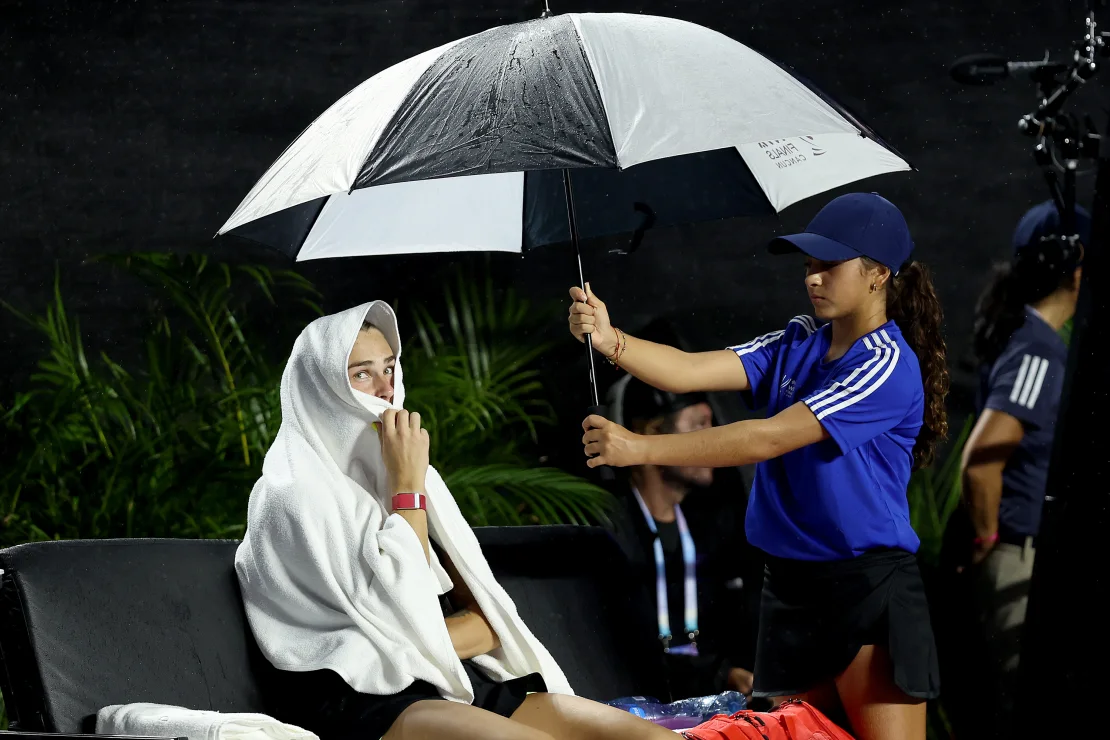The Women’s Tennis Association (WTA) Finals is an end-of-year tournament which is supposed to celebrate the very best of women’s tennis, but instead drew the ire of some of the players involved and was even compared to the infamous Fyre Festival – the luxury festival which turned into anything but – by a UK newspaper.
Issues began before a ball was even hit. The venue in Cancún, Mexico, was still being built in the weeks ahead of the competition and players, including then world No.1 Aryna Sabalenka, accused the WTA of disrespect due to a lack of organization, saying the surfaces of the main court and practice courts felt “unsafe.”
There was then the issue of scheduling, with the WTA Finals culminating just two days before the BJK Cup, organised by the International Tennis Federation (ITF), began in Seville, Spain.
It meant many of the sport’s top players opted not to play the latter – an end-of-year tournament dubbed the World Cup of tennis.
To make matters worse, the WTA Finals finale was delayed a day due to prolonged bad weather which plagued matches throughout, meaning there was just 24 hours between one tournament ending and the other starting.
Meanwhile, American star Jessica Pegula played 136 matches in 2023 across singles, doubles and mixed doubles – she played her latest match on November 6. That’s an average of a match every 2.2 days since the start of the year.
Tennis great Billie Jean King, who helped set up the WTA in 1973 and is now an ambassador of the BJK Cup, told CNN that organizations needed to work better together to stop such clashes in the future.
“What the sport needs to do is actually work together, which is really difficult,” she said, speaking ahead of the Cancún event, adding that the BJK Cup confirmed its start date “way before” the WTA Finals.
“I think we really should think about the schedule together. I think we need to take care of our sport the most. Put the sport first and figure out the scheduling.”
Pressure on WTA
Women’s tennis boasts a wide pool of world-class talent and the future of the sport looks safe in the hands of a host of promising youngsters.
But the WTA Finals – won by Poland’s Iga Świątek – will be remembered for photos of miserable-looking players on court enduring stormy conditions, the result of holding the outdoor tournament on the coast of Mexico during hurricane season.
“I’m dying laughing or maybe crying,” Sabalenka said on X, formerly known as Twitter, in response to a montage of players playing in high winds and rain at this year’s event.

Reigning Wimbledon champion Marketa Vondrousova also joined Sabalenka in her condemnation of the event.
“We work hard all year to get to the Finals and in the end it’s just a disappointment,” Vondrousova said on Instagram after being knocked out of the competition.
“[The] stadium is not at all ready for the matches and to me it feels like the people from [the] WTA are absolutely not interested in how we who are supposed to play on that court feel.
“We do not feel that anyone listens to us and is interested in our opinions.”
In a statement to CNN after the tournament finished, the organization promised to work with players to implement change.
“As we’ve shared with players, the WTA is actively implementing specific improvements, and we are committed to reviewing proposals from players while maintaining a strong future for the Tour and women’s tennis,” it said.
In truth, there were rumblings of discontent long before the WTA Finals, when a group of players sent the WTA a letter urging them to address a number of topics; from pay to a congested calendar, and plenty in between.
WTA chairman Steve Simon has come under increasing pressure this year, with tennis great Martina Navratilova saying that “maybe it’s time for new leadership.”
“For me personally, this being a woman’s association and being involved for such a long time from the beginning, we’ve only had two women at the head of it. I think it’s time, hopefully, when we get a new leader, that it’s a woman,” Navratilova told Amazon Prime.
Simon responded with a letter of his own during the WTA Finals, outlining to players how the organisation was handling the issues raised.
But there looks to be no magic solution to the array of problems facing women’s tennis at the moment.
Room to improve
King, the architect of the women’s game, said putting the good of the game front and center of any decision-making was the best place to start.
“It’s hard to get people to work together. We have to put our sport first, which is all I thought about since I was little, like making it professional when it was amateur,” she said.
“You know, the women were getting cut out in the early days and we found a way to not be cut out and to have our tour and to make things happen. We need to continue to do that.
“But I think about men’s and women’s tennis, I don’t just think about women’s tennis. It’s about our sport that matters.”


